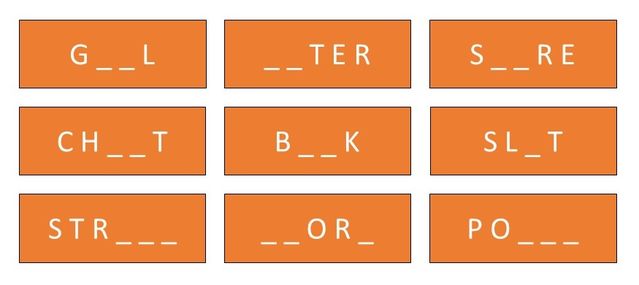Personality
How to Become a Better Judge of Character
The "illusion of asymmetric insight" may influence your character judgements.
Posted December 12, 2019 Reviewed by Matt Huston
Are you up for a little game? Below is a set of word fragments with blank underscores representing missing letters. There are multiple possibilities for completing each fragment to create an English word. Your task is to note down the first word that comes to your mind for each of the nine fragments.

How did you get on? Did you manage to complete each word? If so, please take a closer look at your responses now. Do you think the way you completed the word fragments reveals anything about your personality, desires, goals, and motives?
Why yes or no?
Word completion task
When participants of a psychology experiment were asked to fill in a version of the word completion task, the vast majority denied any meaningful connection between their word choices and personality. Instead, they described their choices as determined by the situation or else completely random. This finding is hardly remarkable. Indeed, why would a simple vocabulary task reveal the complexities of a person’s character?
Given the participants’ initial doubts about the task’s revealing powers, it was all the more surprising that they appeared to change their minds when asked to comment on another person’s word choices in the same task. Evaluating someone else’s word list, most people suddenly appeared convinced their word choices were meaningful. Indeed, they were quite happy to speculate about the other person’s character traits. Below are a few example statements from participants in the experiment:
- "The person seems goal-oriented and thinks about competitive settings." [GOAL, SCORE, STRONG, WINNER]
- "If I had to guess, I'd say that this subject is a nature lover type." [GILL, WATER, BARK]
- “He doesn't seem to read too much, since the natural (to me) completion of B_ _K would be 'book.' BEAK seems rather random, and might indicate deliberate unfocus of mind.”
- "I think this girl is on her period ... I also think that she either feels she or someone else is in a dishonest sexual relationship, according to the words WHORE, SLOT (similar to slut), CHEAT..."
The illusion of asymmetric insight
The above character evaluations seem hardly fair, and point to an important double standard. Clearly, participants applied different principles to the interpretation of their own task choices compared to the choices of someone else. A likely reason for this is the “illusion of asymmetric insight.”
This illusion is a common thought bias, which encompasses a number of misguided beliefs:
- People believe that the observable choices and actions of others are more revealing than their own similar choices and actions.
- Based on the observable choices of others, people believe that they know others better than others know them.
- Relatedly, people believe that they know themselves better than others know themselves.
Detailed experimental research on the phenomenon further demonstrated that the illusion of asymmetric insight applied to both acquaintances as well as closer friends. Finally, the beliefs were found to extend to group situations, with people believing to have better insights into the character traits of outgroup members than outgroup members had into their traits.
Where does this bias come from?
The biased belief in one’s own superior knowledge about other people is a surprising psychological phenomenon. It is thought to be rooted in a general tendency to consider one's own personality to be more complex and multi-faceted than other people’s. In an experiment, people were asked to indicate how much of their personality was easily observable and how much was hidden beneath the surface. Most participants thought their own personality traits were much less visible than those of others.
With many people consistently underestimating the complexity of other people’s minds, and given the general lack of detailed information on other people’s private thoughts, observers are quick to rely on public behaviours to judge another person’s character. In doing so, many underestimate the importance of situational pressures that contribute to specific behaviours. Thinking back to the initial word completion task, possible situational factors may include the physical environment of a participant, which might prompt specific words choices. For example, in the case of the word fragment “B _ _ K,” the physical environment of a school could prime people to choose the word “book” as opposed to alternative options such as “beak” or “bark.” Another consequence of relying on outward behaviours for judging people’s characters is the frequent use of inappropriately broad stereotypes. In the word completion task, for instance, many participants used crude personality types to characterise others. Notable examples included mentions of “goal-orientated” and “nature lover” types, which are broad descriptions and therefore unlikely to capture any person’s detailed and subtle personality profile.
This failure to acknowledge other people’s complex characters combined with a natural tendency to believe in the accuracy of one’s own thoughts and perceptions (also referred to as naïve realism) ultimately leads to the overconfident belief in one's own superior knowledge about other people’s minds.
What can you do?
The illusion of asymmetric insight can have negative consequences. Inaccurate judgements of other people may lead to unwarranted prejudice or unfair treatment of others—particularly if they are members of different social groups. Have you noticed your own tendency to assess people’s characters based on minimal information? If so, this might be a cue to move towards an approach of greater mindfulness and non-judgement. By considering how hurtful someone else’s misinterpretation of your own personality can be, you can foster an appreciation for the complexity of other people’s minds and delay initial character judgement. Because, as the writer Joe Hill aptly put it: “You think you know someone. But mostly you just know what you want to know.”
Facebook image: Max4e Photo/Shutterstock
LinkedIn image: Mangostar/Shutterstock




